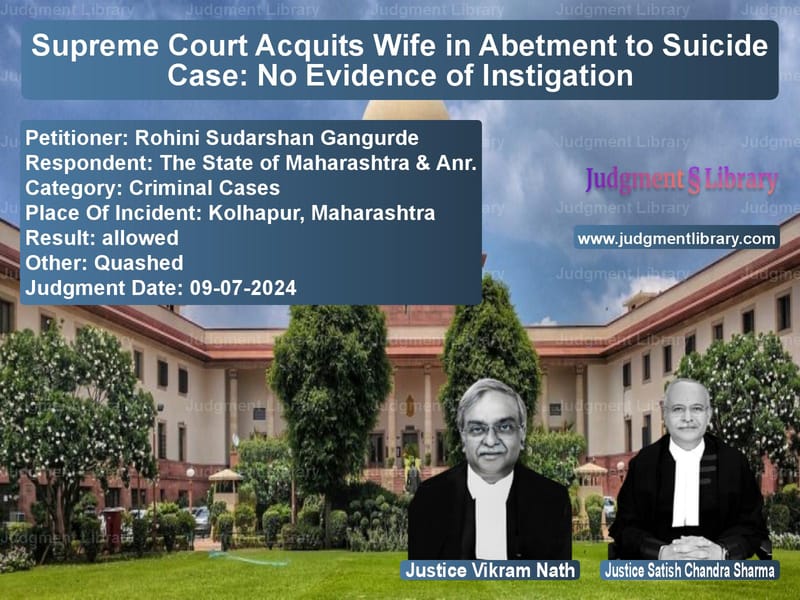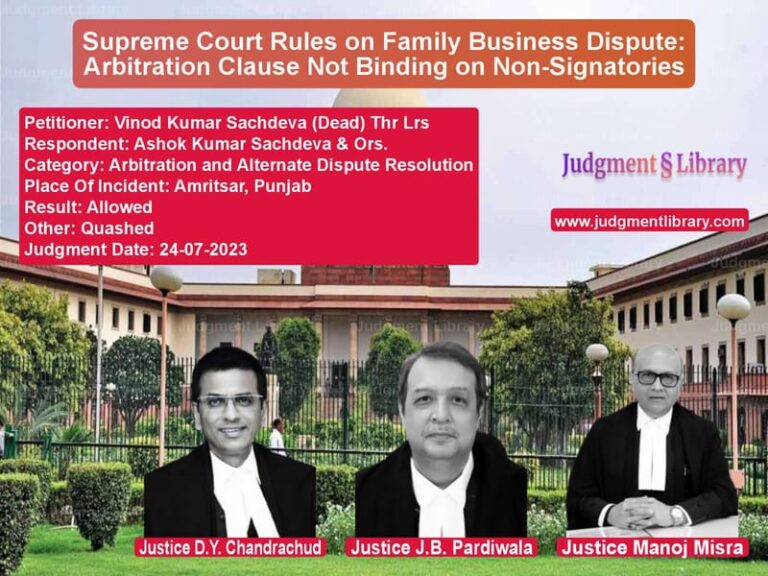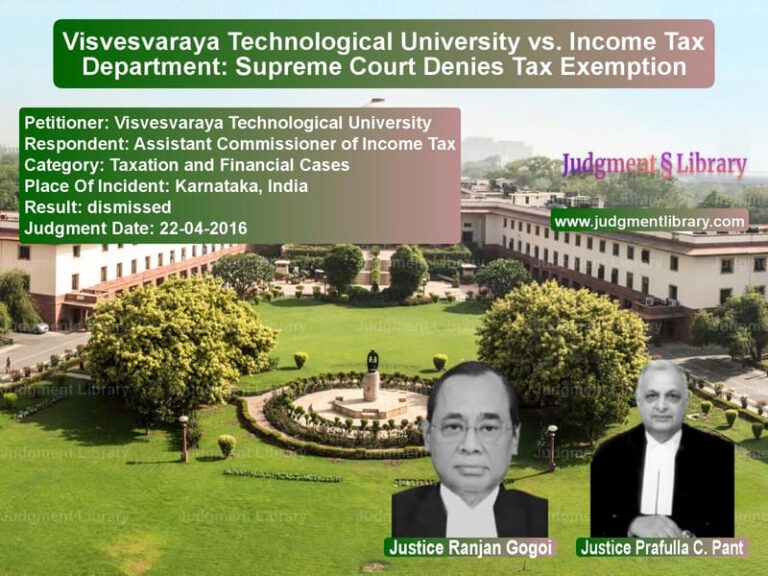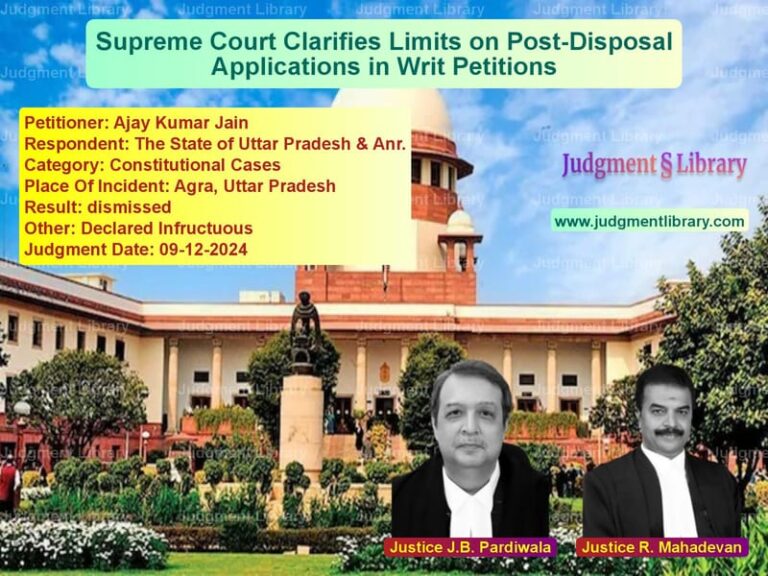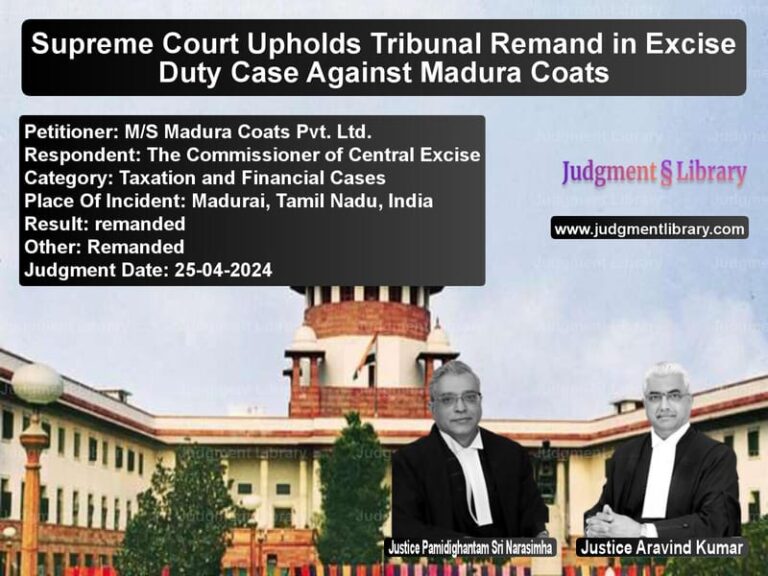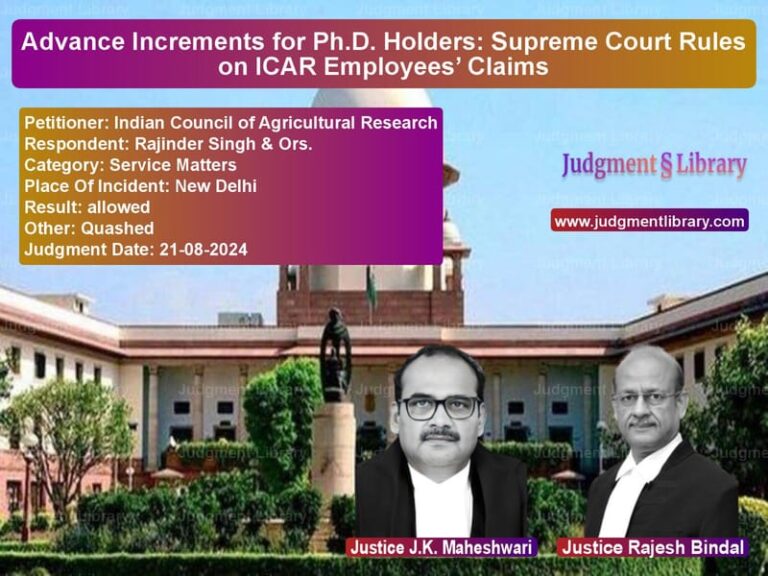Supreme Court Acquits Wife in Abetment to Suicide Case: No Evidence of Instigation
The case of Rohini Sudarshan Gangurde v. The State of Maharashtra & Anr. revolves around the crucial legal question of whether marital discord and allegations of harassment amount to abetment of suicide under Section 306 of the Indian Penal Code (IPC). The Supreme Court, in its judgment dated July 10, 2024, set aside the Bombay High Court’s order and granted discharge to the appellant, stating that there was no direct evidence linking the wife to her husband’s suicide.
The judgment reinforces the principle that abetment requires a clear act of instigation or active involvement by the accused, and mere marital disputes or allegations of harassment do not automatically constitute an offense under Section 306 IPC.
Background of the Case
The case stems from the tragic suicide of Sudarshan Gangurde on February 17, 2020, who was found hanging at his residence in Kolhapur. His wife, Rohini Sudarshan Gangurde, was accused of abetting his suicide and was charged under Section 306 IPC. The complaint was filed by Usha Gangurde, the deceased’s mother, alleging that her son was harassed and beaten by his wife, which ultimately led him to take his own life.
Read also: https://judgmentlibrary.com/supreme-court-upholds-conviction-in-family-dispute-turned-murder-case/
The case involved several critical aspects:
- The couple had a love marriage in 2015, against the wishes of their families.
- They had been living separately from their families in Kolhapur.
- A son was born to them in 2017.
- Marital discord arose, with the deceased’s family alleging that the appellant harassed him for money and pressured him to transfer ownership of their jointly owned house.
Allegations Made by the Deceased’s Family
The complainant, Usha Gangurde, alleged the following:
- The appellant frequently beat and verbally abused the deceased.
- She pressured him to transfer ownership of their jointly owned house to her name.
- She sent obscene messages to him, further aggravating his distress.
- The deceased confided in his parents about the alleged harassment before his suicide.
Additionally, two colleagues of the deceased provided statements regarding an incident in 2019 where the appellant allegedly created a disturbance at his workplace.
Defense by the Appellant
The appellant argued the following:
- The deceased was an alcoholic, and their conflicts were due to his drinking problem.
- She had no role in his suicide, and there was no evidence of instigation or encouragement to commit suicide.
- The house was jointly owned, so the allegation that she demanded its transfer to her name was baseless.
- There was no history of complaints or police reports regarding the alleged harassment prior to the suicide.
Legal Considerations: What Constitutes Abetment of Suicide?
The Supreme Court examined the legal framework surrounding abetment of suicide under Section 306 IPC, which reads:
“If any person commits suicide, whoever abets the commission of such suicide shall be punished with imprisonment of either description for a term which may extend to ten years, and shall also be liable to fine.”
Section 306 must be read along with Section 107 IPC, which defines abetment as:
- Instigating someone to commit suicide.
- Engaging in a conspiracy that leads to suicide.
- Intentionally aiding someone in committing suicide.
Supreme Court’s Observations
The Supreme Court made the following key observations:
1. No Direct Instigation or Encouragement
The Court found that the prosecution failed to prove that the appellant actively encouraged or instigated the deceased to commit suicide. It cited S.S. Chheena v. Vijay Kumar Mahajan (2010), where it was held:
“Abetment involves a mental process of instigating a person or intentionally aiding a person in doing a thing. Without a positive act on the part of the accused to instigate or aid in committing suicide, conviction cannot be sustained.”
2. Mere Marital Disputes Do Not Amount to Abetment
The Court emphasized that conflicts between spouses are common, and unless there is clear evidence that the accused deliberately pushed the deceased towards suicide, charges under Section 306 IPC cannot stand. It referred to Amalendu Pal v. State of West Bengal (2010):
“In cases of alleged abetment of suicide, there must be proof of direct or indirect acts of incitement to the commission of suicide. Merely on the allegation of harassment without any positive action proximate to the time of occurrence, conviction in terms of Section 306 IPC is not sustainable.”
3. Absence of a Suicide Note and No Prior Complaints
The Court noted that:
- No suicide note was found linking the appellant to the deceased’s decision to end his life.
- No formal complaints were filed by the deceased or his family before the suicide regarding any alleged harassment.
4. Statements from Witnesses Did Not Prove Instigation
Although some colleagues mentioned an altercation between the deceased and the appellant, there was no evidence that this led to the suicide. The Court reiterated that instigation must be proximate and compelling.
Supreme Court’s Final Verdict
After analyzing the case and the relevant legal principles, the Supreme Court ruled:
- The appellant’s discharge application should have been allowed.
- The High Court and Trial Court orders rejecting her discharge were set aside.
- The prosecution failed to establish a direct link between the alleged harassment and the deceased’s suicide.
Conclusion
The Supreme Court’s ruling in Rohini Sudarshan Gangurde v. The State of Maharashtra & Anr. reinforces the principle that marital discord alone cannot be equated to abetment of suicide. The judgment ensures that criminal law is not misused in family disputes and that prosecution under Section 306 IPC requires concrete evidence of active instigation or aiding in suicide.
Read also: https://judgmentlibrary.com/kidnapping-for-ransom-supreme-court-acquits-accused-after-21-years/
Petitioner Name: Rohini Sudarshan Gangurde.Respondent Name: The State of Maharashtra & Anr..Judgment By: Justice Vikram Nath, Justice Satish Chandra Sharma.Place Of Incident: Kolhapur, Maharashtra.Judgment Date: 09-07-2024.
Don’t miss out on the full details! Download the complete judgment in PDF format below and gain valuable insights instantly!
Download Judgment: rohini-sudarshan-gan-vs-the-state-of-maharas-supreme-court-of-india-judgment-dated-09-07-2024.pdf
Directly Download Judgment: Directly download this Judgment
See all petitions in Bail and Anticipatory Bail
See all petitions in Attempt to Murder Cases
See all petitions in Legal Malpractice
See all petitions in Judgment by Vikram Nath
See all petitions in Judgment by Satish Chandra Sharma
See all petitions in allowed
See all petitions in Quashed
See all petitions in supreme court of India judgments July 2024
See all petitions in 2024 judgments
See all posts in Criminal Cases Category
See all allowed petitions in Criminal Cases Category
See all Dismissed petitions in Criminal Cases Category
See all partially allowed petitions in Criminal Cases Category

